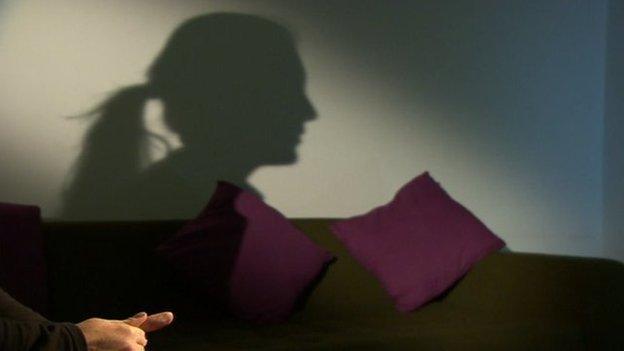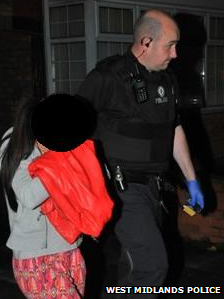Human trafficking: Why do so many victims refuse help?
- Published

Many human trafficking victims form a "Stockholm Syndrome"-type attachment to their captors, experts say
In a series of raids on suspected illegal brothels in Birmingham West Midlands Police took five women into protective custody. They are thought have been brought into the UK by traffickers, but why have all the women refused counselling?
The phrase 'Stockholm Syndrome' is usually reserved for hostages who in some cases form a powerful, emotional attachment to their captors.
But the charities tackling human trafficking say that a number of victims of the trafficking gangs are suffering from symptoms of the Syndrome that was first coined in the 1970s following a bank siege in the Swedish capital.
Despite the more obvious reason such as the fear of reprisals from those who enslaved them, West Midlands Police say there are many reasons why victims stay silent.
"Victims are exploited in four main ways - forced labour, sexual exploitation, domestic servitude and benefit fraud. Those who traffic people may do so by force or coercion," said Det Supt Tim Bacon.
"They either do not see themselves as victims, or they may have a suspicion of authorities and a lack of awareness that (authorities) are in a position to help. They also fear traffickers will accuse them of being complicit in their trafficked situation.
"Often, there can be a type of Stockholm Syndrome - where due to unequal power, victims create a false emotional or psychological attachment to their controller."

Five women rescued from suspected brothels in Birmingham this week have all refused counselling, police said
Calls for care improvement
Stop The Traffik is a London-based group that works to create and change awareness of the problem.
A spokeswoman said: "A lot of women have been groomed into their situation, so there is a huge sense of loyalty to their captors.
"For many, it can be the first relationship they have ever had; they have no other frame of reference, and are working for this person 12 hours a day, seven days a week.
"But the after-care system for UK victims is not great.
"Drop-in venues are available for women who work on the street, but for trafficking victims, behind closed doors, there is none."
One trafficking victim who did seek help - and now advises others to do the same - is Svetlana.
Free from the abuse of her ordeal, she has used the help and support available to rebuild her life - and now offers that support to others.
She said: "At a party when I was 18, a man approached me and started yelling and punching me, saying he was going to take me away.
"I was forced into a vehicle and told someone would meet me at the other end. This was in London.
"I was forced to take drugs and pictures were taken of me; and that is when I first got a clue what was happening to me. I was forced to work as a prostitute.
"Later I was sold to another man for £6,000 and told I would have to work that cost off through prostitution."
Despite a fear of her captors, Svetlana plotted her escape at a service station, where she "plucked up the courage" to ask staff for help.
She was put in touch with police and the Salvation Army, who work around-the-clock internationally to help identify and support trafficking victims.
Major Anne Read, Salvation Army anti-trafficking response co-ordinator, said: "We have the government contract for managing the support for all UK adult trafficking victims.
"That means when a victim is rescued, or escapes, they are referred to us to see if they need or want help with medical, legal, or accommodation matters."
Friday is Anti-Slavery Day and will see the Salvation Army holding a range of UK-wide events to raise even more awareness of the issue.
But for now, the daily nightmare of human trafficking continues for hundreds of powerless victims.
- Published15 October 2013
- Published23 March 2012
- Published16 February 2012